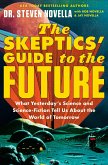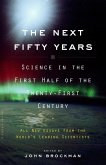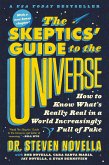In the tradition of Bill Bryson's A Short History of Nearly Everything, a smart and entertaining guide to the future. Mark Stevenson-a writer, deep thinker, and stand-up comedian-set out simply, asking, "What's next for our species?" and then traveled the globe in pursuit of the answers. Along the way, he visited the Australian outback to visit the farmers who can save us from climate change, met a robot with mood swings, and talked to the Spaniard who's putting a hotel in space. While some might be overwhelmed, or even dismayed by the looming realities of genome sequencing, synthetic biology, a nuclear renaissance, and carbon scrubbing, Stevenson remains, well, optimistic. Drawing on his singular humor and storytelling to break down these sometimes complicated discoveries, An Optimist's Tour of the Future paints a wonderfully readable, and completely enthralling portrait of where we'll be when we grow up- and why it's not so scary.
Hinweis: Dieser Artikel kann nur an eine deutsche Lieferadresse ausgeliefert werden.
Hinweis: Dieser Artikel kann nur an eine deutsche Lieferadresse ausgeliefert werden.








